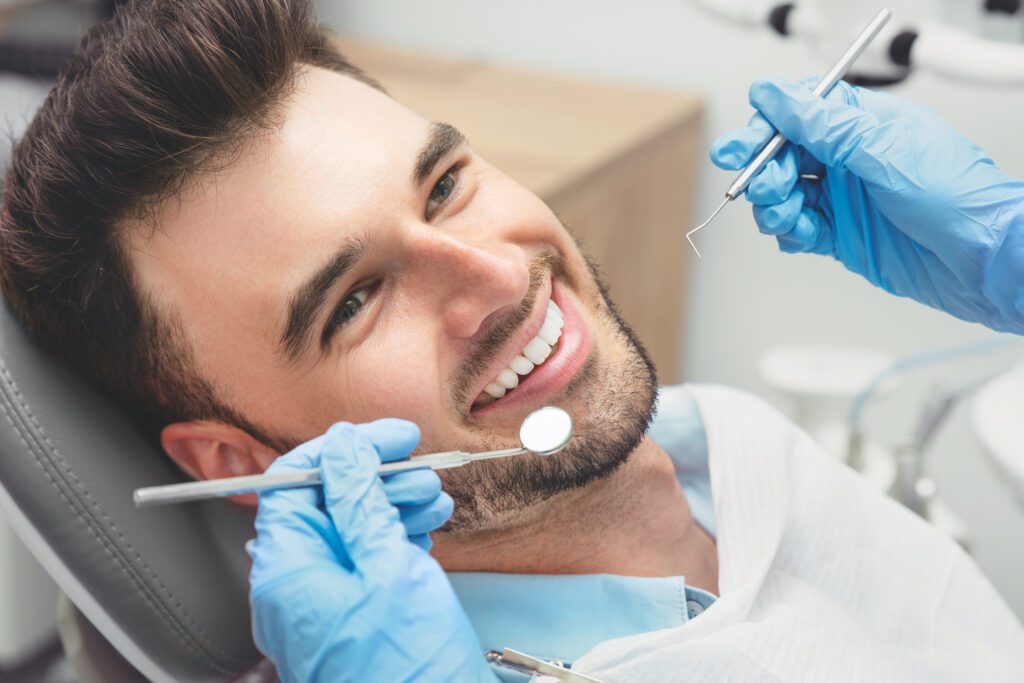Dental bonding is a cosmetic dentistry solution. It applies to cosmetic and restorative concerns. The teeth bonding material is a malleable composite resin that we color-match to the shade of white that you desire. Your dentist uses bonding to repair chipped teeth, close small gaps in the smile, and many other things.

Teeth Bonding in Denton, TX
Dental bonding is a simple procedure we complete in just one visit to our office. It comes with all of the benefits you get with porcelain veneers, but temporarily. Bonding can also assist with various oral health issues and helps keep you as confident in your smile as possible.
Teeth bonding is so popular because it can handle many different issues. It’s a temporary solution, so even children can get it for oral health. It’s also more cost-effective because it doesn’t last as long as veneers. Almost anyone is eligible for teeth bonding because of all these things.
What Can Teeth Bonding Treat?
There’s a wide array of conditions that bonding is capable of treating. Typically, professional teeth whitening is used for discolored teeth. However, not all discoloration responds to traditional methods. Bonding material can match any shade, and we can mold it to completely cover your discolored tooth from sight.
Because of its malleability, it can treat chips, cracks, and breaks in your teeth. If a portion of your tooth breaks off, the sharp edges can harm the soft tissues in your mouth. It can also expose nerves, causing more pain. We mold bonding material to fill in the crack or the portion of the tooth that’s broken off. It protects those areas from further damage, too.
Each time we use bonding material, it’s a custom process. If you have small gaps between your teeth that don’t require orthodontic intervention, bonding can close them. We mold the material to look like a natural, even smile.
The Benefits of Dental Bonding
One of the biggest benefits is how many conditions bonding can treat. Almost any cosmetic dental problem and multiple restorative issues respond well to dental bonding treatment. In addition to aesthetic benefits, dental bonding helps strengthen your teeth and can eliminate the presence of decay after a cavity. Patients with bonding also usually have teeth less sensitive to hot or cold foods and beverages.
Because it’s temporary and cost-effective, it’s one of the most accessible dental treatments. It’s more affordable than solutions like dental bonding. It’s one of the rare cosmetic dental treatments that are available to children as well. There are no permanent alterations to the tooth, so there are no worries for the future of your child’s tooth. At any point, we can remove the bonding material from the teeth.
Dental bonding is very minimally invasive. Solutions like porcelain veneers and dental crowns require removing some of the natural tooth structure. With dental bonding, we usually just have to roughen the surface of your tooth. This allows the bonding material to adhere to the surface better. It only requires a single visit to our dental office because all the needed materials are there. Bonding doesn’t require anything made by a dental lab.
Lastly, advances in composite resin have made dental bonding much more durable in recent years. While it isn’t as durable as porcelain, bonding can last for many years with proper care. Regular checkups and cleanings ensure the bonding material remains as effective as possible.
The Teeth Bonding Process
Teeth bonding is a simple procedure that we complete in a single day. We start by using a local anesthetic to numb the area to ensure you’re comfortable. You shouldn’t feel any pain during the process, but you may sometimes feel pressure.
We start by preparing the tooth for the bonding material. A minimal amount of tooth structure is removed so the bonding material can adhere better. If we’re using the bonding material for a filling, we’ll need to drill out the decayed part of the tooth and reshape it. This is the only time you’ll need the anesthetic.
Bonding material can be any shade of white. We’ll show you an array of shades for you to pick one. We’ll ensure that it’ll look natural in your smile. Especially if your bonding treats tooth discoloration, you’ll want the material to match the other teeth perfectly.
We roughen up the area of the tooth where we’ll be applying the bonding material. This helps the material to adhere better to your tooth. The bonding material is like putty, so the dentist molds it into the perfect shape for the job. We’ll ensure you love the result and cure it with a special light to harden it. We polish the material so that it matches the natural sheen of the rest of your teeth.
It only takes around 30-60 minutes per tooth for bonding treatment. The entire curing process happens when you’re in the dentist office so you can use your teeth right after your appointment. However, if local anesthesia is used, please wait until the effects wear off before eating.
Frequently Asked Questions
We have answers to some of the most common questions patients have about dental bonding.
Does dental bonding prevent cavities?
Dental bonding doesn’t prevent cavities. It repairs existing damage by filling in decayed areas with composite resin. To avoid future cavities, you still need to brush, floss, and visit a dentist regularly.
Will my dentist have to shave my teeth for dental bonding?
Usually, dental bonding requires minimal tooth preparation. Your dentist might lightly roughen the surface to help the bonding material adhere better. Unlike crowns or veneers, it often doesn’t involve significant shaving of your tooth.
How many teeth can I have bonded at once?
You can have multiple teeth bonded in a single visit. The exact number depends on the extent of work and your dentist’s recommendations. Bonding several teeth might take a bit longer, but it’s entirely feasible.
Does bonding stain easily?
Dental bonding can stain over time. The composite resin isn’t as stain-resistant as natural enamel or porcelain veneers. Consuming coffee, tea, and red wine or using tobacco can discolor the bonded areas, so good oral hygiene is important.
Is dental bonding good for receding gums?
Yes, bonding can help with receding gums by covering exposed tooth roots. It reduces sensitivity and protects vulnerable areas from decay. However, it doesn’t address the underlying cause of gum recession so that additional treatment might be necessary.
Can bonding fix worn-down teeth?
Dental bonding works well for moderately worn teeth. We apply a strong, tooth-colored resin to rebuild the worn areas and restore your smile. While bonding can last several years with good care, severely worn teeth might need crowns instead. Let’s check your teeth and discuss which option suits your situation best.
Get Teeth Bonding in Denton, Texas
Teeth bonding is a cost-effective solution for a variety of dental problems. Call us to schedule an appointment or request a consultation online.
